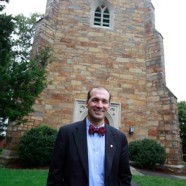
I arrived at Milton in 2009, but Milton was not new to me. My family’s legacy here is a source of pride. Few heads of school can claim that their existence is attributable to their school. My parents met and fell in love at Milton during the spring of their Class I year. Several members of the Class of 1958 claim that I am a gift from them to the Academy (though they may choose a less flattering term).
Onward from that spring, my family’s journey is not a storybook tale. Many remember it more with a sense of sadness rather than joy. In the summer of 1974, my father died unexpectedly. I was six years old; my brothers were one year and nine years; and my mother just 33. My last memory of my father is his following our car on the Maine Turnpike and signaling us to stop, so that he could hand us the life-vests that we’d forgotten. My brothers, Mom and I were headed for a family gathering in Connecticut. We never saw my father again.
My words give many of you pause, I know. I have faced these silences since I was a child. In fact, few people other than my mother ever mentioned my father’s name. I have learned that most people do not know what to say in the face of tragedy, and therefore say nothing. I harbor no resentment about this, but I am relieved to finally understand it. Returning to Milton has brought blessings, none more meaningful than the outpouring of stories about my dad. I have heard more about my father in the last two years of my life than in the previous 35. My childhood and adult life have been filled with many blessings, but no life is without moments of misfortune, or failure, or great sadness. Recovering from adversity is a crucial life skill, a skill acquired by way of significant pain.
Silver linings do exist, however. Losing a parent has given me perspective, both on my losses and my blessings. I understand each of my disappointments within my own, unique context. That point of view has increased my capacity for gratitude and appreciation. In addition, I am comfortable addressing others’ tragedies, particularly sudden death. Living through an immense sadness, and watching others do the same, has given me faith that we all have the capacity to recover from the darkest of hours.
As head of school I am called upon to help members of our School address disappointment, failure and loss. At these times, I find myself saying to parents: None of us would ever wish this upon you or your child, but approaching this experience appropriately will undoubtedly make your child stronger, and better equipped to confront life’s inevitable tribulations. In fact, the idea of breezing through high school without surmounting any significant reverses concerns me. Some children have, for various reasons, been protected from the kind of difficulties that can further a child’s development and maturity. How will these young
people deal with life’s twists and turns? How will they respond to a first failing grade? The loss of a job? The death of a loved one?
Modern parenting’s tendency toward over-protection has been a subject of frequent public discussion. Protective instincts come from love and care, but if they’re not moderated, they can handicap a child who must prepare for life beyond his parent’s control. My favorite parenting book is Wendy Mogel’s The Blessing of a Skinned Knee. She has recently followed that book with The Blessing of a B Minus. In her books, Ms. Mogel demonstrates the importance of allowing children to confront “falls” so that they learn to get up. We need to heed her advice as we encourage young people to live, learn and grow.
Last year, Milton faced the most difficult and unwelcome of School events—the death of one of our students. We are still mourning the death of Jennifer Pham, as we continue to heal. The experience helped us gain strength; it unified us; it demanded our resilience. We comforted and supported one another, gained greater appreciation for those around us, and shared an intimate, transformative experience. Jennifer’s family helped us with this, and we helped them, as well. We certainly did not seek this event, but responding to it together, with grace, and dignity and care, was valuable. Every morning at Milton, I wake up two hundred yards from the one place where my father is memorialized—the Apthorp Chapel. I derive a deep and certain strength from this connection. It reminds me, constantly, of all that my father has given to me, both in his living and in his dying.
Todd B. Bland



